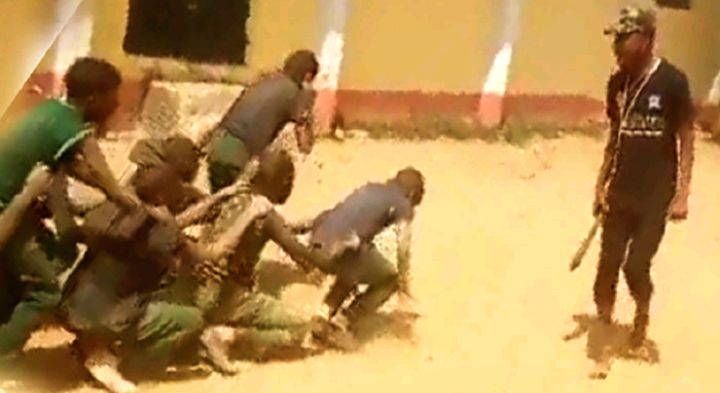Adeleke Dorcas Temitope

The tragic deaths of young pupils in Nigerian military schools underscore a severe problem with the intensity of training and the harsh disciplinary practices employed.
These institutions, designed to instill discipline and military prowess, have been sites of suffering and even death due to the extreme measures imposed on students.
Blaise Aliyu, a 15-year-old student, was reportedly punished to death by two of his senior colleagues at the Air Force Comprehensive School in Kaduna.
It is an incident that has plunged the institution into mourning Blaise, who had already faced the cruel hardship of losing his parents in 2013, found comfort and companionship in his twin brother.
Both facing the harsh realities of life without a parent who were students at a boarding school on Mando, Kaduna.
According to several reports, the tragic incident was unfolded when two SS3 students summoned Blaise to their room.
A mere punishment turns to fatal encounter in the hands of the seniors. His seen lifeless body is a testament to the brutality he endured which now lies cold in the mortuary.
Blaise Aliyu, full of potential and dreams, was no more. However, The Nigerian Air Force is investigating the incident, with a commitment to uncovering the truth and preventing future tragedies.
Also, Blaise’s death is not the first time young pupils lose their lives in military school due to harsh punishment.
In June 2022, a SS1 student of Command Secondary School, Enugu, Eneh Chinemerem, was reportedly flogged to death by a soldier-teacher whose identity was not revealed for having bushy hair.
The mother, Adaeze Chibuzor, broke the news in a Facebook post on the Nkanu People of Enugu State Nigeria platform with pictures of the deceased showing a swollen eye and head before his demise.
The family of the deceased, along with the public cry on Facebook outcries for help and demanded justice from the government.
Another case was also reported in the popular military school in Lagos in March 2021. Ibrahim Abdullahi( surname withheld), a 15 year old student who is vibrant and a promising young boy.
His parents are proud and happy about his enrollment to the school not knowing that their son’s life would be tragically cut short due to extreme disciplinary measures by senior cadets.
On a day in March, Senior cadets ordered him to perform repetitive push-ups and sit-ups even eyewitnesses described the exercises as excessively harsh, with Ibrahim forced to continue without adequate rest or hydration.
He pleaded but was turned on deaf ears. After numerous punishment, Ibrahim’s body could not take it again but the senior cadets ignored his visible signs of physical distress.
After several punishment, Ibrahim collapsed but the cadets dismissed his collapse as an attempt to evade further punishment. As he was not responding, fellow students and junior cadets alerted the school authorities.
Immediately, the school’s medical personnel were summoned urgently, and Ibrahim was rushed to the school’s medical facility.
Despite their efforts to revive him,which they weren’t able to, he was later transferred to the Lagos University Teaching Hospital where doctors confirmed that he had passed away .
What a bad news to his parents! The cause of death was attributed to complications arising from extreme physical exertion and dehydration.
The administration of the military school expressed profound regret over the incident. However, The Commandant (name withheld) released an official statement promising a thorough investigation into the circumstances surrounding Ibrahim’s death.
Moreover, the Amnesty International Nigeria and various activists have condemned these incidents, demanding thorough investigations and justice.
The National Association of Nigerian Students (NANS) and other bodies have also voiced their concerns, urging for systemic changes to protect students.
Also, the culture within these military schools often includes rigorous physical training, harsh punishments, and a lack of adequate oversight.
Ex-students have shared their experiences of severe beatings, intimidation, and extreme drills, which sometimes result in physical and mental trauma.
UNICEF has also highlighted the issue of violent discipline in Nigerian schools, noting that a significant percentage of children face severe punishment.
The organization calls for the protection of children’s rights and the implementation of non-violent disciplinary measures.
The Nigerian military education system needs to find a balance between discipline and humane treatment.
While some former students and parents praise the discipline and training received, others have suffered irreparable harm.
Reforms are essential to ensure the safety and well-being of students without compromising the educational and disciplinary goals of these institutions.
The tragic stories of Blaise Aliyu, Eneh Chinemerem, and Ibrahim Abdullahi are stark reminders of the urgent need for reform in Nigerian military schools to prevent such losses in the future.
